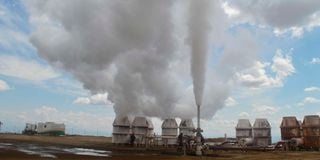Tiaty banking on land titles to shoot down Baringo banditry

A newly launched well at Geothermal Development Company (GDC) Paka Hills drilling site in Tiaty, Baringo County on August 4, 2023.
Tiaty in the heart of Baringo County has long been synonymous with the constant threat of banditry, a distressing reality for locals.
However, beneath the surface of flying bullets and the hardships faced by residents lies a deeper, longstanding issue—the absence of a secure land tenure system.
Spanning approximately 6,000 square kilometres, Tiaty constitutes is nearly half of Baringo County.
Despite its vastness, residents lack legal land documents that can validate their ownership claims.
This insecure land system has resulted in poor land use practices and has been a persistent source of bloody conflicts, leading to numerous casualties over the years.
Yet, amid these challenges, Tiaty is on the brink of a transformative development—a groundbreaking initiative that positions it as the first Arid and Semi-Arid Lands (Asal) region in Kenya to embark on the process of acquiring land titles.
The catalyst for this transformation is the Geothermal Development Company (GDC), which has undertaken drilling operations in Paka and Silali Hills, boasting an estimated geothermal potential of 3000MW.
The adjudication programme initiated in Tiaty is poised to turn this historically conflict-ridden area into a thriving development hub with the vast geothermal energy reservoir beneath the underutilised lands holding the promise of resolving the region's long-standing land ownership issues.
Collaborating with the Community Land Management (CLM) committee at Paka Hills, residents have joined hands with GDC, the National Land Commission (NLC), and the Ministry of Lands, Housing, and Physical Planning.
This collaborative effort has enabled them to fulfil the requirements outlined in the 2016 Land Act, facilitating the expedited acquisition of title deeds.
Jacob Ngoletiang, the chairperson of the Paka Hills CLM, emphasises that obtaining a title deed will empower the community to apply for development loans.
“As a community, we have never seen a title deed. We don’t know what it looks like. If we get it the prolonged unresolved historical and natural resources injustices will be resolved,” said Mr Ngoletiang. The community also envisions allocating an area for tourism to generate additional income for development and education.
“This will earn the community money for the development and education of our children,” said Mr Ngoletiang.
But beyond the economic prospects, the ongoing adjudication process is not only addressing land rights but also fostering women's participation and empowerment.
The arrival of GDC in the area has brought about significant positive changes, including improved access to education, infrastructure development, and a sustainable supply of clean water.
Ms Eunice Kura, the treasurer of the Paka Hills community said the adjudication process initiated by GDC has enabled women to participate and know their land rights, something which was unheard of among the community.
“I have learned something about the disempowerment of women and children through the denial of their land rights. At least I know my land rights thanks to GDC. I now know a woman has a role to play in land matters,” said Ms Kura.
“After attending the process of community land registration, I want to be a role model to other women and girls and create awareness of the need to understand the land registration and ownership process within our community.”
She expressed hope that children will acquire education as the community will use title deeds to apply for loans to lend to members.
As the residents of Paka Hills progress toward securing title deeds, the programme is seen as a benchmark for other pastoralist communities in Kenya, marking a milestone in the government's ongoing efforts to strengthen community land rights.
The adjudication in Tiaty is a testament to the commitment of the National Land Commission to expedite the process and ensure that pastoralist and agro-pastoralist communities living in Asals across Kenya can benefit from similar reforms.
Seven years after the promulgation of the Community Land Act in 2016, this initiative represents a unique case where NLC is actively involved in the transfer of community land to public use.
"This is the first time NLC is participating in the transfer of community land to public use," remarks Jacob Kipaa, the NLC chief valuation and taxation officer.
"NLC is valuing all community land in Kenya, but this is a unique case because Paka community has progressed and has a registered community, and the land has been gazetted for an adjudication programme. Therefore, they will be compensated very fast."
Kipaa emphasises that the Paka Hills adjudication programme is a pioneering effort that will serve as a benchmark for all other pastoralist communities seeking to initiate the registration of community land.
Valuation inspections are currently underway, with NLC officers on the ground identifying the property that GDC aims to acquire.
By the end of November, a registered terrestrial map is expected to be available, clearly outlining the area of interest for GDC.
This will be followed by the issuance of a title deed in the name of the Paka community.
Land experts contend that the reforms introduced by the government will significantly bolster community land rights.
Thomas Mburu, GDC's legal officer, acknowledges that the land acquisition process is both expensive and time-consuming.
Over the past three years, GDC has worked towards its target of compensating over 4,000 Paka community members for acquiring about 100 acres of their land. With an allocated budget of Sh20 million for compensation, GDC plans to acquire more land as drilling operations progress.





